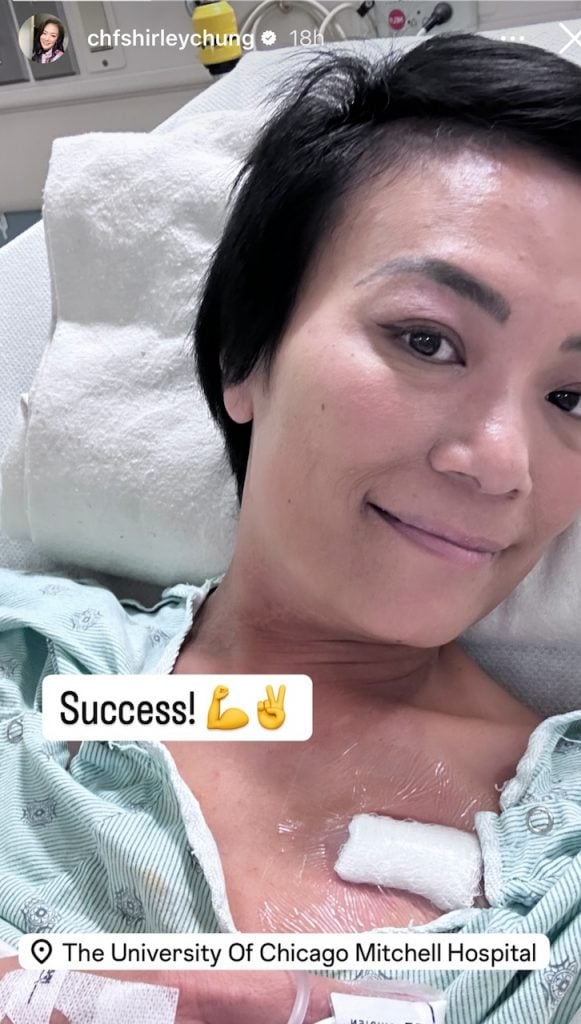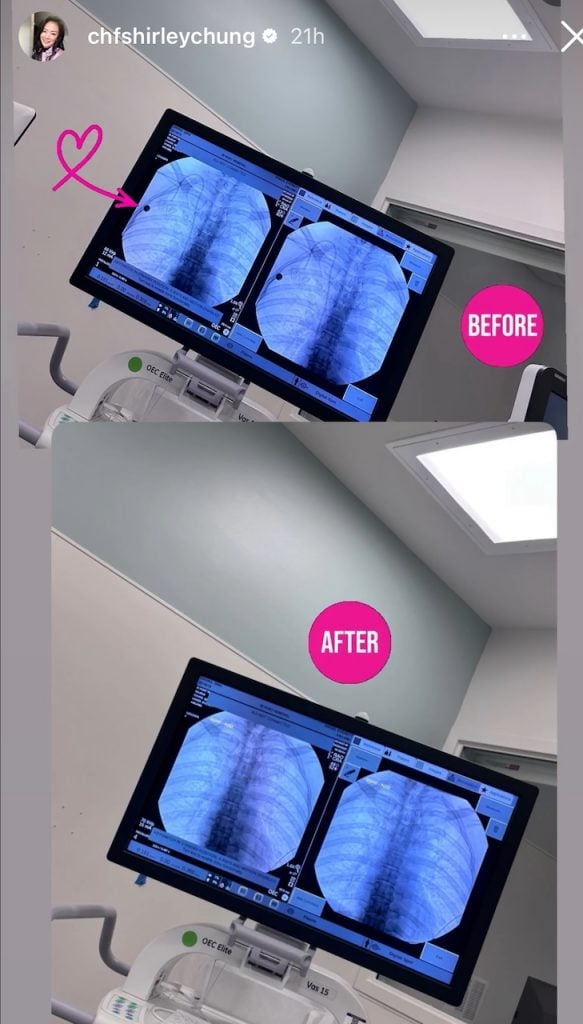Shirley Chung's Tongue Cancer Journey
- Legendary Chinese-American chef Shirley Chung—who is recovering from stage four tongue cancer—is celebrating another milestone in her cancer journey: getting back clear scans after a routine checkup.
- Chung, who is known for being a finalist in “Top Chef: New Orleans” and “Top Chef: Charleston” took to social media to share her “success” after a recent scan, which comes after she had her “G-tube” removed and completed both chemotherapy and radiation treatments.
- Tongue cancer is a type of oral cancer, also referred to as a head and neck cancer.
- The disease doesn’t always show signs, but symptoms can include: a lump on the side of the tongue, pain, a sense of fullness in the throat, difficulty swallowing, the feeling of a lump in the neck or throat, voice changes, and ear pain.
- Tongue cancer is more commonly found in people older than 40 and is twice as common in men. Smokers have a five times higher risk of developing the disease than nonsmokers.
The 48-year-old Chinese-American chef, who was a finalist in “Top Chef: Charleston” and “Top Chef: New Orleans,” wrote “success” alongside a selfie of herself in a hospital bed at the University of Chicago Mitchell Hospital this week.
Read More
Survivorship isn’t just an end state — it’s a continuous journey. It begins the moment a person is diagnosed with a significant health condition and continues throughout their life. You might hear people say things like, “from the moment of diagnosis, you become a survivor.” It’s a powerful sentiment that reflects the courage and resilience involved in battling a serious illness.

The “survivorship” phase might include the challenge of dealing with physical and emotional changes, attending regular check-ups, the fear of recurrence, or the need for long-term medication. Despite these hurdles, many survivors find unique strength, growth, and transformation during this time.
Survivorship is much more than just the absence of disease—it’s a new stage of life, a rite of passage. Your journey might not have been one you would have chosen, but through it, you’ll uncover a greater understanding of yourself and what you’re capable of.
If you’re navigating this new survivorship terrain, like Chung, it might be challenging, but remember, you’re not alone. There are ample resources and support systems designed to help you along the way.

Shirley Chung’s Tongue Cancer Diagnosis
Chung, who made the difficult decision to close her L.A. restaurant called Ms. Chi Cafe while she focused on her recovery, first announced her diagnosis in July 2024.
“I have some personal news to share with you. Since last year December, I had a series of dental issues, I bit my tongue severely; I fractured my tooth and had to extract it and get an implant… we thought it was because I am a heavy teeth grinder,” she said in an Instagram post.
“And I was too busy to see a EMT specialist. The end of May, ulcers erupted in my mouth and my oral surgeon discovered a hidden tumor under my tongue. A few days later, I was diagnosed, stage 4 tongue cancer, as cancer cells also spread into my lymph nodes.”
View this post on Instagram
Shortly after receiving her diagnosis, all Chung said she heard was “‘option 1, surgery, 100% removal of your tongue.'”
Thankfully, Chung’s determination to find another treatment option led her doctor to tell her and her husband about a special case that took place at the University of Chicago. It was there they were told about how another person battling tongue cancer was cured through chemotherapy and radiation, something she described as a “unicorn case.”
“Higher survival rate, or keep my tongue? I chose to keep my tongue, I am a fighter, I am a chef, I can be that unicorn too,” Chung said at the time.
By December 2024, Chung shared a celebratory Instagram post, revealing that she hit a milestone in her cancer treatment: 10 weeks of radiation and chemo treatments.
She went through some challenging side effects, that made it difficult to sleep, eat, and even drink water.
Chung later revealed she has since been able to drink smoothies again, as well as eat soups, ice cream and egg custard.
After noting her taste buds are slowing returning to normal, she added, “I can taste 50% of sweet and savory and all the warm spices.”
Chung also recounted having an emergency surgery to replace her “G tube,” otherwise known as a gastrostomy tube, which is surgically placed in one’s body through the abdomen to the stomach to bring in nutrition, fluids, and medicine.
Her most recent procedure was to have her “G-tube” removed, which she has celebrated as just another step in her healing process.
A G-tube is a “gastrostomy feeding tube insertion” which is put in place through something called an endoscopy, MedlinePlus reports.
The procedure is performed for a variety of reasons and some people only have the G-tube in for a short period of time, though they can also be left in permanently.
‘Adversity and the Art of Happiness,’ How Hardship Makes You Stronger
Tongue Cancer: A Type of Head & Neck Cancer
According to Cedars-Sinai, several types of cancer develop in the tongue, with the most common being squamous cell carcinoma.
The two types of tongue cancer are:
- Cancer of the oral tongue, which consists of the front two-thirds of the tongue that you can stick out
- Cancer of the base of the tongue, the area which is the back one-third of the tongue that extends down the throat
Although some people may be diagnosed with tongue cancer and have no risk factors, Cedars-Sinai says this type of cancer is most commonly found in adults 40 years old and up. Men are also twice as likely to be diagnosed with tongue cancer.
Other risk factors include:
- Smoking [smokers are 5x more likely to develop tongue cancer than nonsmokers]
- Drinking alcohol
- Human papillomavirus (HPV)
African-American men also have a greater risk than caucasians.
Tongue cancer may be hard to spot in its early stages, however it’s important to be aware of the symptoms, as catching the disease earlier will lead to an easier treatment path.
Symptoms might include:
- An unusual lump on the side of the tongue
- An ulcer-like lump, of a grayish-pink to red color
- A lump that bleeds easily when touched
- Trouble swallowing
- Voice changes
- Pain in the ear
- Pain in the throat
- Feeling of fullness in the throat
HPV and Cancer Risk: The Basics
Throat cancer is usually diagnosed through X-rays, CT scans, and PET scans. A diagnosis also often requires a biopsy.
For tongue cancer treatment, surgery, chemotherapy and radiation therapy are usually done.
It’s much more common to know someone who has a head or neck cancer, like tongue cancer, now-a-days than it was several decades ago. And that’s because of its strong connection to the human papillomavirus, also known as HPV, which is the most common sexually transmitted infection in the United States.
“From the 1980s to the 2010s, the rate of HPV-related head and neck cancers has gone up by 300 percent,” Dr. Ted Teknos, a head and neck cancer specialist at University Hospitals Seidman Cancer Center in Cleveland, Ohio, told SurvivorNet during a previous interview.
Expert Resources on HPV-Related Cancers
- A Major New Effort Announced to Vaccinate Young Boys Against HPV and Cancers Linked to Sex
- Busting the Myths About the HPV Vaccine
- HPV Is Responsible For 5% Of Cancers In The World: An Advocate’s Crucial Message
- HPV and Cancer Risk: The Basics
- Majority of Throat Cancer Diagnoses Are Caused by HPV – Here’s What You Need to Know
The vast majority of people in the United States — both men and women — will eventually get infected with HPV, according to Dr. Allen Ho, a head and neck surgeon at Cedars-Sinai.
“The important thing to know about HPV is that there are many different strains, and only a couple of them tend to be more cancer-inducing,” he told SurvivorNet.
“Probably less than 1% of the population who get infected happen to have the cancer-causing virus that somehow their immune system fails to clear, and over 15 to 20 years it develops from a viral infection into a tumor, and a cancer.”
It’s unclear whether HPV alone is enough to trigger the changes in your cells that lead to head and neck cancers, or whether this happens in combination with other risk factors like smoking.
Contributing: SurvivorNet Staff
Learn more about SurvivorNet's rigorous medical review process.

